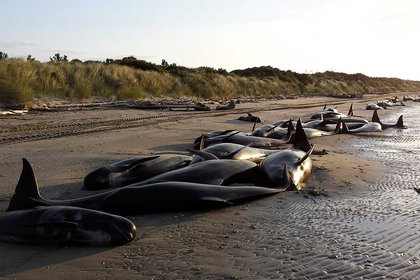
Stranded pilot whales on Farewell Spit. Photo credit: Project Jonah.
Each year New Zealand experiences mass strandings of long-finned pilot whales along its shoreline. Exactly why these whales strand remains unclear. However, new biological insights into these phenomenal events has just been published in an international peer reviewed journal.
New research which examined more than 1500 pilot whales post mortem over an 80-year period has now revealed unique characteristics of Southern Hemisphere long -finned pilot whales. Estimates of length-at-birth, maximum ages, and sexual shape dimorphism (differences between male and female form) all differ significantly to those previously reported for the North Atlantic subspecies, indicating important subspecies differences in morphology (branch of biology that deals with form and structure of animals), longevity, and sociality.
Maximum ages of 31 and 38 years were estimated for males and females, respectively. The study also reported pronounced sexual dimorphism with respect to shape, with males having proportionally longer pectoral fins, wider tail flukes, and taller dorsal fins compared to their female counterparts.
The study, published in the Journal of Mammalogy, was undertaken by a team of scientists based at Massey University, Auckland University of Technology, Galway-Mayo Institute of Technology, Ireland and The Institute of Zoology, London.
Lead author Dr Emma Betty from Massey University’s Cetacean Ecology Research Group, says the value of long-term datasets and tissue archives collected during mass stranding events cannot be underestimated.
“Knowledge of population biological parameters can contribute to assessing the resilience of a population in the face of increasing anthropogenic [human induced] pressures,” she says.
Research Director for the Cetacean Ecology Research Group Professor Karen Stockin says the ongoing, long-term whale stranding research in New Zealand is really starting to bear fruit.
“New Zealand’s international reputation for mass whale strandings is globally recognised. However, it’s the decades of data and samples collected in partnership with iwi and the Department of Conservation that is most exceptional.”